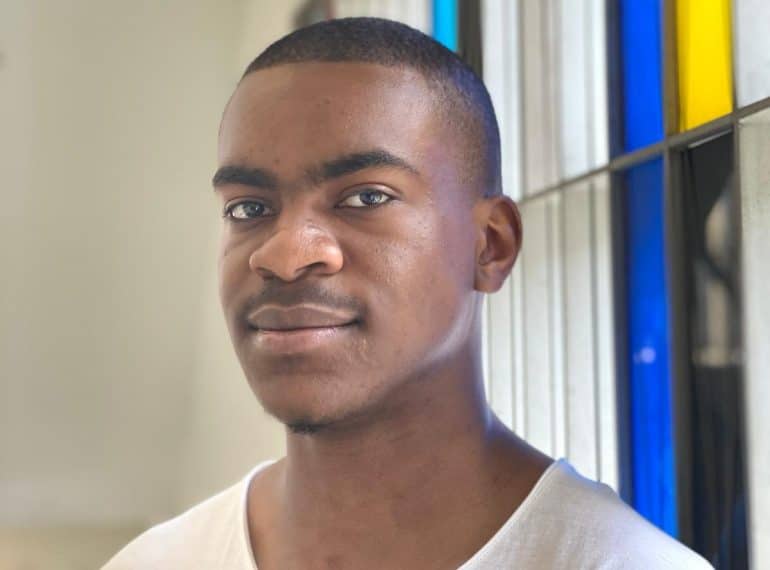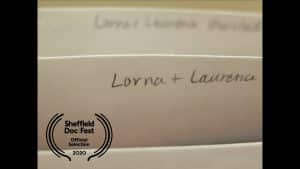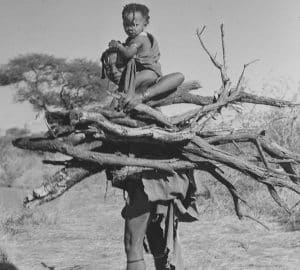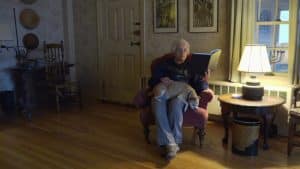
Harvard undergraduate Che Applewhaite’s first-ever documentary found success at an international film festival.
 Che’s film, A New England Document, was an official selection at the 2020 Sheffield Doc/Fest (Sheffield International Documentary Festival) and had its premiere online during the summer. He is now working on a second documentary during his final year at Harvard.
Che’s film, A New England Document, was an official selection at the 2020 Sheffield Doc/Fest (Sheffield International Documentary Festival) and had its premiere online during the summer. He is now working on a second documentary during his final year at Harvard.
The 16-minute A New England Document profiles the work of 20th-century ethnographers Lorna and Lawrence Marshall, using images and text from the Marshall Collection at Harvard University’s Peabody Museum of Archaeology and Ethnology. But, as well as recounting their expeditions in Africa, Che (OE 2010–2017) also explores his own concerns with history, with colonialism and with anthropology. He is currently studying Anthropology and History & Literature at Harvard and is due to graduate in May 2021.
In a director’s statement written to accompany the launch of the film, Che said he aimed to show “what the archive didn’t intend”. The 40,000-plus photos in the collection extensively depict the indigenous peoples of the Kalahari, but Che pointed out that few are of the Marshall family, “much less of its patriarch – main expedition funder and co-founder of modern-day defense company Raytheon [Laurence Marshall]. Working with and against the silences in the archive required a polyphonic palimpsest of archival found footage, photographs and documents paired with my own shooting in the Peabody Museum, wider Cambridge, Massachusetts and Peterborough, New Hampshire.”
 Che, who was born in Trinidad, told The Harvard Gazette staff writer Manisha Aggarwal-Schifellite in an interview: “I was interested in how [I could] reckon with the silences in the archives that prevent me from having a fuller understanding of my own history as a person under an empire.”
Che, who was born in Trinidad, told The Harvard Gazette staff writer Manisha Aggarwal-Schifellite in an interview: “I was interested in how [I could] reckon with the silences in the archives that prevent me from having a fuller understanding of my own history as a person under an empire.”
Starting in 1952, the Marshalls went on extended expeditions to the Kalahari Desert over four decades, amassing a collection of more than 40,000 photographs.
Che spent a term going through the photographs and diaries, and then learned some of the skills he needed to make a film, including storyboarding, camerawork and video-editing, helped by staff at Harvard’s Film Study Center.
He met New York Times writer Elizabeth Marshall Thomas, daughter of the collection’s creators, who invited him to film at her New Hampshire home. The finished film included readings of the diaries featuring both her voice and Che’s.
 “Reading some of the things she has written and having conversations with her about her family helped strengthen the film,” he said. “I got to see how people [in a family] can have very different life paths and outcomes, and I wanted to show that in the film.”
“Reading some of the things she has written and having conversations with her about her family helped strengthen the film,” he said. “I got to see how people [in a family] can have very different life paths and outcomes, and I wanted to show that in the film.”
Che’s website describes the resulting work as “fragmentary counterpoint upon the haunting sounds of archival ghosts – of future possibility arising from once-known pasts”.
During Sheffield Doc/Fest, Che was a contributor to a virtual panel session, Decolonizing Documentary.
He is now continuing to create films and is working on a creative senior thesis documentary, entitled In Loving Memory, which Che’s website describes as narrating “the experiential archives of a Black mother whose father and son breathe once more through her writings on grief and the young athletes she coaches at Normandy High School in St. Louis, Missouri”.
